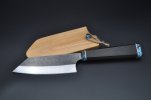Sando
Knife Maker
- Joined
- Jul 4, 2002
- Messages
- 1,148
I like building japanese petty knives with Wa handles. They are super useful and easy to handle for most folks.
I have people ask for one of these, but they are on a budget.
I know traditional handles are magnolia. But they are also replaceable and not expected to last. Most US knife users are not going to replace a handle.
What's a good idea for an inexpensive wood that's going to hold up?
Greenburg has Banksia. It looks good, pretty darned inexpensive. But, will it last for years of kitchen use?
I have people ask for one of these, but they are on a budget.
I know traditional handles are magnolia. But they are also replaceable and not expected to last. Most US knife users are not going to replace a handle.
What's a good idea for an inexpensive wood that's going to hold up?
Greenburg has Banksia. It looks good, pretty darned inexpensive. But, will it last for years of kitchen use?

